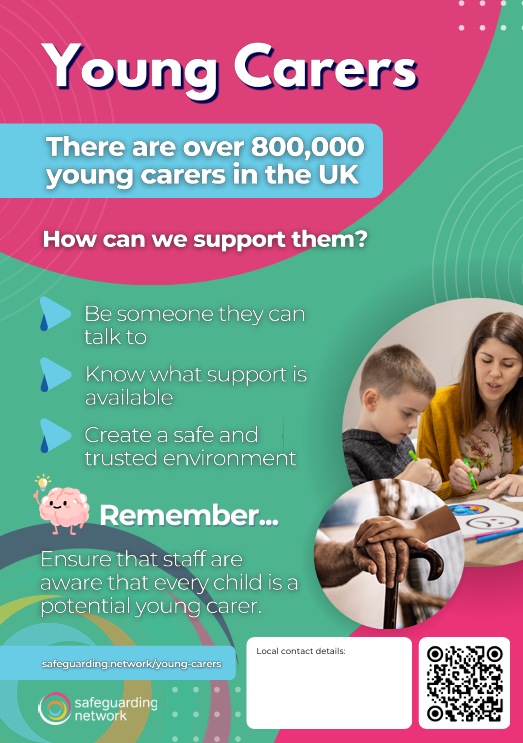Introduction
Young carers are often an overlooked group who silently shoulder immense responsibilities while balancing the demands of their education. They take on responsibilities far beyond their years, such as regularly cooking meals, managing finances, doing all household chores and providing emotional/physical support to their loved ones.
As well as the responsibilities of their caring role, young carers often face additional challenges regarding their education. The dual roles of caregiver and student can place a heavy burden on them, impacting their academic performance, attendance and overall well-being. Juggling educational commitments with caregiving duties can lead to high levels of stress, exhaustion and feelings of isolation among young carers.
Need more?
Thank you for visiting our resources pages. These are free to everyone as is our fortnightly safeguarding bulletin – general safeguarding information is too important to restrict. Become a member to access lots more, including training materials for you to deliver in-house on each topic in Keeping Children Safe in Education.
Sign up for FREE fortnightly bulletin.
What about training?
We can deliver training for your setting on this and other subjects via online platforms, or face-to-face in certain areas. Just get in touch to discuss your requirements.
We must recognise the importance of supporting young carers. By shining a light on the challenges young carers face and offering tailored support, we can empower these vulnerable children and young people to reach their full potential both academically and personally.
Definition of a young carer
A young carer is someone aged under 18 who helps look after a relative who has a disability, illness, mental health condition, or a drug or alcohol problem. Most young carers look after one of their parents or care for a brother or sister.
Adapted from the NHS
Prevalence
The first inquiry by the All-Party Parliamentary Group (APPG) on Young Carers and Young Adult Carers estimated that there are one million young carers in the UK and revealed that at least 15,000 children, including 3,000 aged just 5 to 9, spend 50 hours or more a week looking after family members because of illness, disability or addiction.
However, many young carers remain unnoticed by their education settings. In January 2023, young carers were added to the January school census return for the first time. In 2024, data showed that 72% of schools reported that they had no young carers in their schools. Young Carers in Schools argues that this is not a true representation of the number of young carers in education settings.
According to Young Carers in Schools, many young carers remain hidden because:
- The condition of the person they care for is not obvious, so people don’t think that the young person needs any help.
- Young carers don’t realise that they are a carer or that their life is different to their peers.
- They want to keep their identity at school separate from their caring role.
- It’s not the sort of thing they feel they can discuss with their friends.
- There has been no opportunity to share their story.
- They’re worried about bullying.
- They worry that the family will be split up and that they will be taken into care.
- They want to keep their caring role a secret and/or are embarrassed.
- They see no reason to tell their story and don’t believe that any positive action will occur after doing so.
Identifying young carers
Schools and other education settings should see this as a common issue. Unidentified young carers are missing out on vital support to help them balance their caring responsibilities and their education.
“We save the government lots of money by doing the work of caring, but we don’t get the help or support we need. I just want to enjoy my childhood as well as being a young carer.”
Early identification of young carers can help to ensure they are supported.
To encourage young carers to step forward, settings can:
- Arrange young carer awareness-raising sessions for staff and students.
- Review your school census return before it’s submitted to check that any young carers known to the setting have been properly coded.
- Have a young carer’s champion – a member of staff leading the support for young carers can build awareness of, and support for, young carers within the setting.
- Have a young carers policy/agreement in place – so that all young carers and know what help is available to them.
- Reduce stigma and ensure that everyone promotes a culture of openness around those who care for others.
- Ensure that staff are aware that every child/young person is a potential young carer and have this in mind when talking with students.
- Reduce the number of times that a child must tell their story.
- Ensure that all staff are aware of the need for privacy when around the child/young person’s peers.
- Ensure that relevant staff are aware of the young carer's needs, and the support measures that have been put in place.
…some teachers are not always aware. They immediately just think you’re a bad student and jump to conclusions.
The importance of settings providing support should not be underestimated. However, this support should consider the specific issues that come with being a young carer.
For example, past research by the Children’s Commissioner identified the importance of the young carer’s phone to them. Their phone is a vital means for keeping in touch with those they care for as well as the services around them.
Impact of caring
We must consider the impact of any sort of caring on children and young people.
Being a young carer can affect every area of a child’s life.
- Physical and mental health – caring for another is often physically and emotionally exhausting. The stress and anxiety of balancing their caring role, managing a household and their education can be detrimental to a child’s mental health. A survey by the Carers Trust found that 44% of young carers ‘always’ or ‘usually’ feel stressed.
- Education – The Carers Trust reports that in 2022/23, young carers missed on average more than a month of their education (23 days of school) compared to 14 days for other pupils. Almost half (46%) of young carers at secondary school in England were persistently absent in 2022/23. MYTIME Young carers says 40% of young carers of secondary school age have received a suspension from school, compared to only 17% of their peers without a caring responsibility.
- Social life – research by Action for Children states 23% of young carers in the UK said that their caring role had stopped them making friends and about 80% of young carers feel lonely during the school holidays.
- Family income - According to the Carers Trust, the cost-of-living crisis has hit young carers and their families hard when they already faced additional costs.
- Outcomes - MYTIME Young carers found only 64% of young carers achieve a 4+ in English and maths, compared to 71% of their peers without a caring responsibility.
Essentially, through taking on caring responsibilities, many young carers are missing out on their childhoods and full educational potential.
I feel like I’m barely getting out apart from school.
Spot the signs
You may be able to identify a young carer if they:
- have poor attendance, are missing from education or are frequently late – a young carer’s responsibilities may mean they frequently have to be absent from school or are unable to arrive at the expected start time.
- are being bullied – young carers are more likely to be bullied because of their caring role, reasons include presenting as withdrawn, not having a social life, general appearance, jokes being made about the person they care for.
- are not getting homework done because of caring responsibilities – young carers may not be able to do homework after school because of their caring role.
- worry because they cannot use their phone to check on the person they are caring for – many settings have restrictions on phone use, but for young carers this can present problems.
- often tired, distracted or withdrawn.
- missing out on trips or extra-curricular activities because they must be at home to care – often these can clash with the requirements of caring.
- outwardly mature for their age.
What to do
How can we support young carers?
Whilst there are specific things, such as respite and arranged leisure activities, that can help young carers access opportunities that may ordinarily be unavailable to them, the importance of daily support within the setting should not be forgotten.
Young carers themselves identify the importance of:
- someone to talk with
- support from their education setting and a better understanding of their situation and individual needs. Can you offer greater flexibility regarding homework deadlines and punctuality? Can you allow them time to contact the ones they care for during the school day for peace of mind? What can you do to help them access extra-curricular activities?
- help with emergency/crisis plans (for example who will care for them if their single parent goes into hospital/who would they contact in an emergency);
- breaks and respite from their caring role, and help from services that understand them
- support for their emotional well-being and mental health
- connections to friends and their communities. Create a whole-setting culture that understands and supports the individual needs of young carers.
- better support for those they care for. How do you ensure they are provided with access to additional support for those they care for and themselves?
All young carers are entitled to an assessment of their needs, either at the point that any agency (children’s or adult’s) identifies that they are a young carer or when a young carer or their family asks for an assessment.
The needs of everyone in the family must be considered to reduce and remove the caring responsibility placed on the child if possible. Seek advice from your local authority as to how to access the local young carers support services.
However, none of this can be put in place until a child or young person is identified as a young carer. The Carers Trust and the Children’s Society developed a resource, designed with teachers and school staff, to help make the task of identifying and supporting young carers in schools as easy as possible.
All young carers must be included in your annual school/college census. The Young Carers Alliance have produced a checklist and top tips that headteachers and senior leaders can use to help complete the census and support young carers.
Take action – and keep taking action until you know children and young people are safe.
"There is no empathy or understanding towards young carers. I still get detention if I cannot finish my homework on time because my brother has had a seizure. If I’m late because I’m helping him, again, I get late marks even when my mum phones and explains. They are really harsh when things go wrong.”
Free young carers poster
This free, downloadable resource raises the profile of safeguarding for your staff team. For use in staff rooms, on safeguarding boards or on the back of toilet doors, the poster includes tips, a space for local contact details, plus a link and QR codes to this resource page. Download the poster from the resources below.
DSL Training Materials
-

Young Carers Presentation
-

Young Carers - Presenter Notes
-

Handout for staff - Young Carers
-

Young carers – Quiz
-

Young carers – Quiz (Answer Sheet)
-

Young Carers Scenario – Early Years
-

Young Carers Scenario – Early Years settings – DSL Information Sheet
-

Young Carers Scenario – Primary Schools
-

Young Carers Scenario – Primary Schools – DSL Information Sheet
-

Young Carers Scenario – Secondary Schools
-

Young Carers Scenario – Secondary Schools – DSL Information Sheet
-

Young Carers Scenario – 16+ settings – DSL Information Sheet
-

Young Carers Scenario – 16+ Settings
-

Young Carers Scenario – SEND settings
-

Young Carers Scenario – SEND settings – DSL Information Sheet
-

Young Carers Scenario – Care settings – DSL Information Sheet
-

Young Carers Scenario – Care settings
Resources
-

Young carers poster
-

Tips on how to help a young carer, from a young carer
-

What is a young carer?
-

Ariel’s Story
-

Young carers support in education
-

Young carers and bullying
-

Know your rights: Support for Young Carers and Young Adult Carers in England
-

Young Carers in Schools
-

Carers’ stories
-

Young carer facts
-

My Mental Health – Video and Toolkit
-

It’s harder than anyone understands
Save time and improve your safeguarding approach…
Bite-size training materials to share with your staff every month.
Support to explore and develop your safeguarding culture.
A huge array of resources and professional experience at your fingertips.
Get in touch now for a personal tour of the site and details of membership benefits.
We look forward to working with you.


